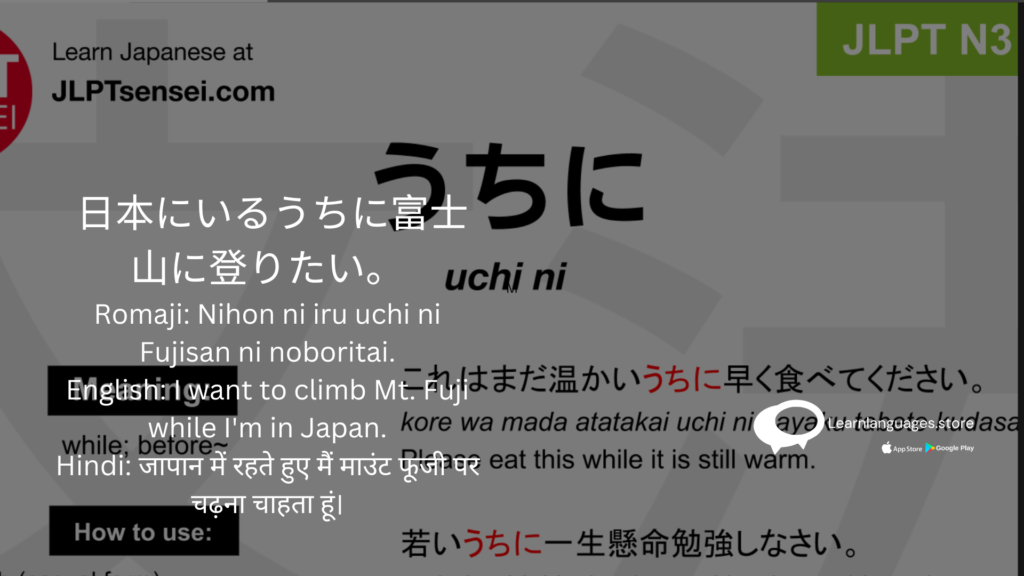Exploring Japanese Grammar: 〜うちに (uchi ni)
Exploring Japanese Grammar: 〜うちに (uchi ni)
Estimated reading time: 4 minutes
Welcome to our deep dive into the fascinating world of Japanese grammar! Today, we’re exploring the JLPT N3 grammar point 〜うちに (uchi ni). This versatile structure can be a powerful tool in your Japanese arsenal, and we’re here to make it fun and engaging with plenty of examples, humorous anecdotes, and detailed explanations.

What is 〜うちに (uchi ni)?
The grammar point 〜うちに (uchi ni) is used to express doing something while a certain condition holds or before it changes. It is often translated as “while,” “during,” or “before.”
Sentence Structure:
- Verb (dictionary form / ている form) + うちに
- Adjective + うちに
- Noun + の + うちに
This structure can convey two main nuances:
- Doing something while a certain condition holds.
- Doing something before a certain condition changes.
Examples
Example 1: Doing something while a condition holds
日本にいるうちに富士山に登りたい。
にほんにいるうちにふじさんにのぼりたい。
Nihon ni iru uchi ni Fujisan ni noboritai.
“I want to climb Mt. Fuji while I’m in Japan.”
- Japanese: 日本にいるうちに富士山に登りたい。
- Romaji: Nihon ni iru uchi ni Fujisan ni noboritai.
- English: I want to climb Mt. Fuji while I’m in Japan.
- Hindi: जापान में रहते हुए मैं माउंट फूजी पर चढ़ना चाहता हूं।
- जापान (Japan) में (mein – in) रहते (rehte – while living) हुए (hue) मैं (main – I) माउंट (Mount) फूजी (Fuji) पर (par – on) चढ़ना (chadhna – climb) चाहता (chahta – want) हूं (hoon).
Explanation: In this sentence, the speaker wants to climb Mt. Fuji while they are still in Japan. The action (climbing Mt. Fuji) should be completed before the condition (being in Japan) changes.
Example 2: Doing something before a condition changes
冷めないうちにどうぞ。
さめないうちにどうぞ。
Samenai uchi ni douzo.
“Please eat it before it gets cold.”
- Japanese: 冷めないうちにどうぞ。
- Romaji: Samenai uchi ni douzo.
- English: Please eat it before it gets cold.
- Hindi: ठंडा होने से पहले कृपया खा लें।
- ठंडा (thanda – cold) होने (hone – becoming) से पहले (se pehle – before) कृपया (kripaya – please) खा लें (kha lein – eat).
Explanation: In this sentence, the speaker is urging someone to eat something before it gets cold. The action (eating) should be completed before the condition (getting cold) changes.
Example 3: While doing something
映画を見ているうちに寝てしまった。
えいがをみているうちにねてしまった。
Eiga o mite iru uchi ni nete shimatta.
“I fell asleep while watching the movie.”
- Japanese: 映画を見ているうちに寝てしまった。
- Romaji: Eiga o mite iru uchi ni nete shimatta.
- English: I fell asleep while watching the movie.
- Hindi: फिल्म देखते हुए मैं सो गया।
- फिल्म (film) देखते (dekhte – watching) हुए (hue – while) मैं (main – I) सो (so – sleep) गया (gaya – went).
Explanation: In this sentence, the speaker fell asleep while watching the movie. The action (falling asleep) occurred during the condition (watching the movie).
Exceptions and Special Usage
While 〜うちに (uchi ni) is generally straightforward, there are a few things to keep in mind:
- Positive vs. Negative Sentences: When used with negative verbs, it often means “before.” For example, 冷めないうちに (before it gets cold).
- Nouns: When used with nouns, add の before うちに. For example, 学生のうちに (while you are a student).
Humorous Anecdotes
Japanese grammar can be dry, so let’s lighten it up a bit!
Imagine you’re in Japan and you really want to try sushi at a famous restaurant. You get there and the chef is known for his quick hands. You tell your friend:
日本にいるうちにこの寿司を食べないと!
にほんにいるうちにこのすしをたべないと!
Nihon ni iru uchi ni kono sushi o tabenaito!
“I have to eat this sushi while I’m still in Japan!”
Your friend responds:
わかるよ、でも財布の中身を確認してね!
わかるよ、でもさいふのなかみをかくにんしてね!
Wakaru yo, demo saifu no nakami o kakunin shite ne!
“I get it, but check your wallet first!”
Sometimes, even while in Japan, budgeting becomes the main course!
Identifying in a Sentence
Identify 〜うちに in the following sentence and explain its usage:
雨が降らないうちに帰りましょう。
あめがふらないうちにかえりましょう。
Ame ga furanai uchi ni kaerimashou.
“Let’s go home before it rains.”
In this sentence, 〜うちに is used with a negative verb 降らない (furanai) meaning “before it rains.”
Conclusion
Mastering 〜うちに (uchi ni) can significantly enhance your Japanese fluency by allowing you to express actions that need to be done while a certain condition holds or before it changes. It’s a versatile and practical grammar point that will undoubtedly come in handy in everyday conversation and help you excel in your JLPT N3 exam. So, practice these examples, use them in your sentences, and you’ll be speaking like a pro in no time!
-
Product on sale
 Japanese N3
Japanese N3₹42,600.00
₹62,600.00 -
Product on sale
 Japanese N4
Japanese N4₹24,300.00
₹32,600.00 -
Product on sale
 Japanese N5
Japanese N5₹18,300.00
₹24,300.00
Learn Languages Store
Vashi,
Email: services@learnlanguages.store










